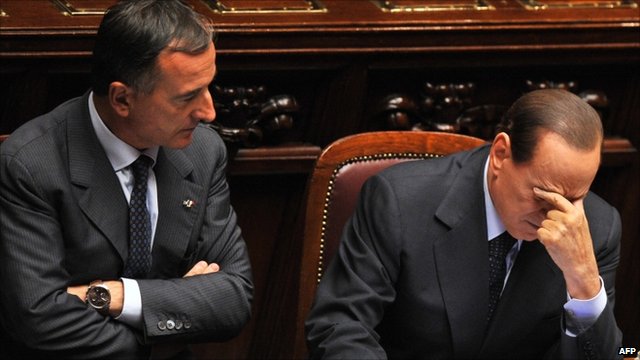 Italy has had its sovereign debt rating cut by Standard & Poor's, the latest move in the deepening European debt crisis.
Italy has had its sovereign debt rating cut by Standard & Poor's, the latest move in the deepening European debt crisis.
S&P cut its rating by one level to A from A+, adding that the outlook for the country was "negative".
It cited fears over Italy's ability to cut state spending and bring its finances in order, particularly given the country's growth prospects.
Italy said the move had been influenced by "political considerations".
A government statement said the downgrade had also been dictated more by stories in the media than by economic reality.
European stock markets opened slightly lower following the announcement, with France's Cac 40 and Italy's MIB indexes falling 0.8%, with Germany's Dax and the UK's FTSE 100 slipping 0.3%.
'Future uncertainty'
Italy recently passed an unpopular austerity budget, but S&P suggested this did not go far enough.
"We believe the reduced pace of Italy's economic activity to date will make the government's revised fiscal targets difficult to achieve," S&P said in a statement.
"Furthermore, what we view as the Italian government's tentative policy response to recent market pressures suggests continuing future political uncertainty about the means of addressing Italy's economic challenges."
Italy follows fellow eurozone countries Spain, the Republic of Ireland, Greece, Portugal and Cyprus in having its credit rating downgraded this year.
The surprise move by the ratings agency will fuel fears of contagion in the eurozone.
Italy has Europe's second-largest debt level and the cost of that debt has been rising in recent weeks as lenders to Italy have become nervous about its ability to repay loans.
The cost of borrowing in Italy and Spain both rose this morning, with Italy's bond yield, which indicates its cost of borrowing, rising from 5.57% to 5.7% in early trading.
However, the euro rose slightly against the dollar to $1.3658 and was virtually unchanged against the pound at 87.010 pence.
"Coming at a time when the world's financial markets are on edge, warily watching for a default by Greece with knock-on unknown effects on the financial system, the optics of this downgrade stink," said Carl Weinberg of High Frequency Economics.
"Perceptions are more important than realities," he added.
"Investors will be shaken, as if they are not shaken enough already, by what appears to be decaying conditions for another sovereign issuer."
'No trust'
Marc Lansonneur, of Societe General Private Banking, said that the surprise move by S&P was likely to increase volatility in the markets.
"The sentiment of contagion is definitely stronger than before," he said.
"If there is no trust in the system, then anything is possible. The less trust you have the more expensive the money is to borrow for European countries and the worse the crisis is. It then starts fuelling itself."
Concern over Greece and whether or not it will default on its loans hit markets hard on Monday.
The Greek government is in talks with the International Monetary Fund and the European Union about getting more bailout money released.
Earlier this month, S&P cut the credit rating of the US from AAA to AA+ for the first time in its history.



